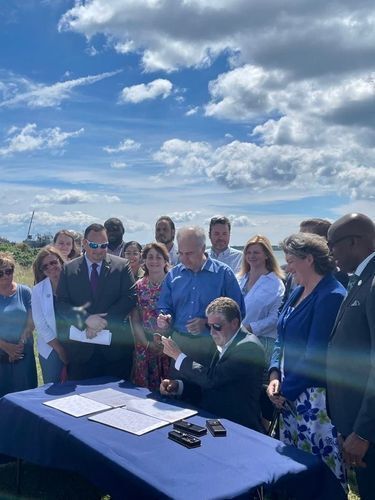Published August 2, 2022
2022 Audubon Legislative Victories
By Priscilla De La Cruz, Senior Director of Government Affairs
In the spring, I was cautiously optimistic that Audubon’s legislative priorities on climate action and the protection of pollinators and forests could advance in the legislature – and in fact, we achieved significant progress.
Legislation to Regulate Neonicotinoid Pesticides
For years we have pushed for a critical step in pesticide management – regulating Neonicotinoids (neonics) for the health of pollinators and people. With your support, we did it! Governor McKee has signed legislation into law on June 27, 2022 (S 2299 sponsored by Senator Josh Miller and H 7129 sponsored by Representative Rebecca Kislak) that will help keep neonics out of the hands of untrained users.
Protection of Core Forests
Forest protection is a priority that progressed with robust collaboration among conservation and clean energy advocates and engagement of legislators in H 7531, sponsored by Representative June Speakman. Although the bill was not voted out of committee, we have built consensus and momentum to enable the protection of core forests and better align renewable energy program incentives with the state’s climate goals. This will aid our efforts to broaden stakeholder engagement and support the passage of legislative solutions to address our solar development and deforestation challenges.
Other legislative victories for the environment and Rhode Islanders:

Governor McKee, elected officials, and advocates gathered at the bill signing ceremony for offshore wind legislation.
A top priority of both the Environment Council Council of RI (ECRI) and Climate Jobs RI (a partnership between labor and environmental groups) was 100% Renewable Electricity by 2033. This goal was recently signed into law, making Rhode Island a national leader and carving out a path for the State to meet the mandatory carbon reduction goals set by the 2021 Act On Climate. Also of significance is the passage of legislation requiring the utility to solicit proposals for 600 - 1,000 megawatt hours of offshore wind.
Additions to the list of significant victories:
- PFAS known as “toxic forever chemicals” in food packaging and drinking water will be banned and capped respectively.
- A statewide single-use plastic bag ban became a reality after years of advocacy.
- We prevented the advancement of a toxic plastics incineration plant legislative proposal to not only build such a facility, most likely in the Port of Providence, but also bypass state oversight.
- Also noteworthy was this year’s state budget that began to leverage federal funding to scale up resources for climate adaptation and resilience projects, investments to critical infrastructure for ports and offshore wind, and the largest staffing expansion for the RI Department of Environmental Management in 20 years.
We cannot thank you enough - our members - for supporting Audubon’s efforts to achieve these victories. We also wish to recognize the collaboration of our partners and legislative champions. Follow these victories and hear about the work ahead of us, by subscribing to the Eagle Eye newsletter. Visit asri.org/lead to sign up today!

















